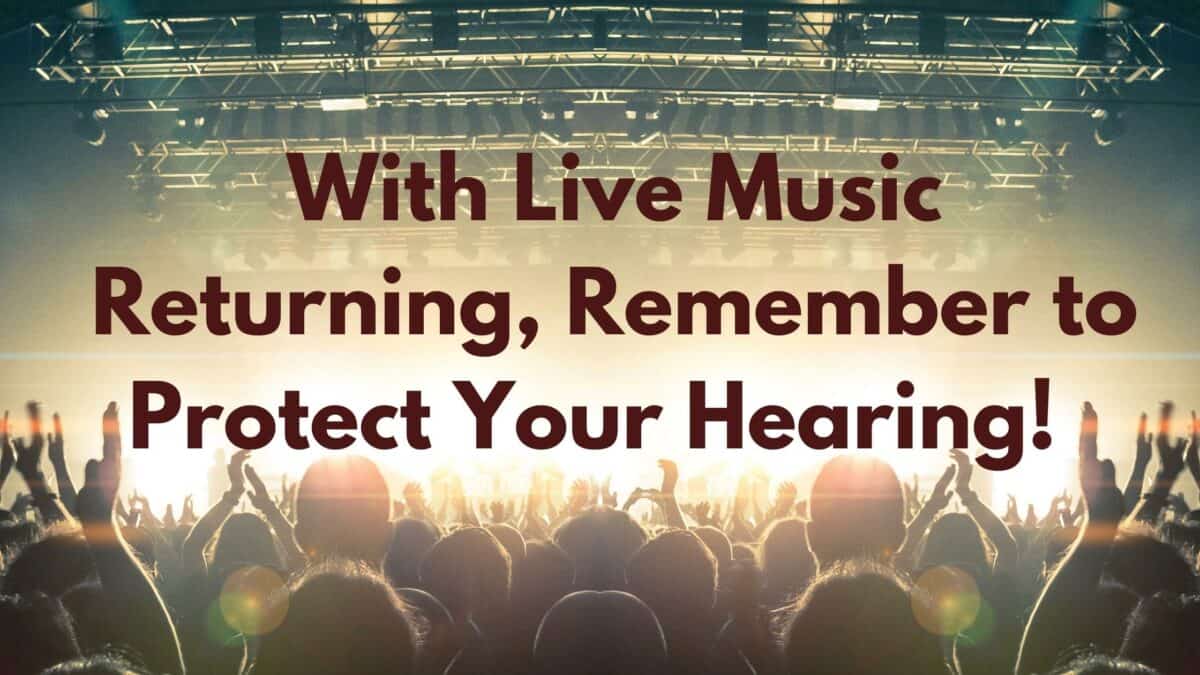We’re all excited to get back into the habit of attending live music events. There’s no thrill like hearing the first notes of your favorite song performed live and onstage. If you’re attending a concert in the near future, you’ll probably expect a certain level of social distancing or some sort of protection against Covid-19. But, there are hidden health consequences of live music performances beyond catching a virus.
Concerts can be scenarios in which you’re exposed to unhealthy levels of noise. And it may sound like an issue you can brush off, but the effects of too-loud sound can be damaging and permanent. One of the leading causes of hearing loss that arises later in life is noise-induced hearing loss, caused by exposure to dangerously loud volumes.
How loud noise can damage your hearing
Noise-induced hearing loss is a permanent condition. It happens when you are exposed to extremely loud noises, damaging the functioning of your hearing system. A sudden loss can happen in a violent event, like an explosion or an accident. Noise-induced hearing loss can also occur slowly with repeated exposure to too-loud sounds over a long period of time.
The importance of inner ear cells
While we give a lot of credit to the outer ear, the happenings of the inner ear are integral to our sense of hearing. The outer ear collects sound from the external world and the sound information is received by the sensitive, even delicate cells of the inner ear. These cells are non-regenerative, which means that they do not repair themselves or regrow once they’ve been damaged. The number of cells we are born with are our lifetime supply.
When these cells are destroyed or harmed due to exposure to dangerously loud noise, they cannot do their job of sending sound information to the brain via the auditory nerve. We simply do not have access to all of the external sound happening all around us, which we experience as hearing loss.
How loud is too loud?
Some industries are synonymous with noise-induced hearing loss, like farming, factory work or the military. That’s why the Occupational Health and Safety Administration (OSHA) has standards about how much noise workers can be exposed to. They agree with leading experts that anything over 85 decibels — the unit used to designate a measurement of sound — is too loud.
And 85 decibels might be less loud than you might think. The noise of traffic from inside a car or the beep of a microwave are both measured at around 85 decibels.
Noise levels at concerts
It’s not just factories and construction sites that can be too noisy for too long. Some of our recreational activities measure well over 85 decibels and yet we pay to attend them! Rock concerts can regularly reach volumes of 100 to 120 decibels. Scientists warn that more than 15 minutes of exposure to sounds exceeding 100 decibels can permanently damage hearing.
All you classical fans aren’t out of the woods. It’s not just rock concerts. A symphonic concert can reach around 95 decibels. What’s more, classical musicians have a higher incidence of noise-induced hearing loss, likely stemming from their placement within the orchestra and the fact that many classical musicians teach and practice more frequently than other performing musicians.
Ways to protect your hearing
You don’t have to swear off live music events in order to protect your hearing. Instead, invest in protective gear like good, custom earplugs or protective headphones. In a pinch, a pair of cheap foam earplugs are better than nothing and most venues sell these at concessions.
Pay attention to your hearing and don’t stand or sit directly in front of any speakers. Notice if your ears feel overwhelmed and take a break to find a quieter spot to give your ears a rest for a few minutes.
Schedule a hearing consultation
If you think you’ve already begun to feel damage to your hearing from exposure to too-loud noise, it’s easy to schedule a hearing consultation and find out. Our team of hearing health professionals can guide you through the quick and painless exam process. We can pair you with the best hearing protection investment for your lifestyle or begin to investigate possible hearing loss interventions for you. Our goal is always to make sure that you’re experiencing the fullest and most vibrant hearing life possible.


